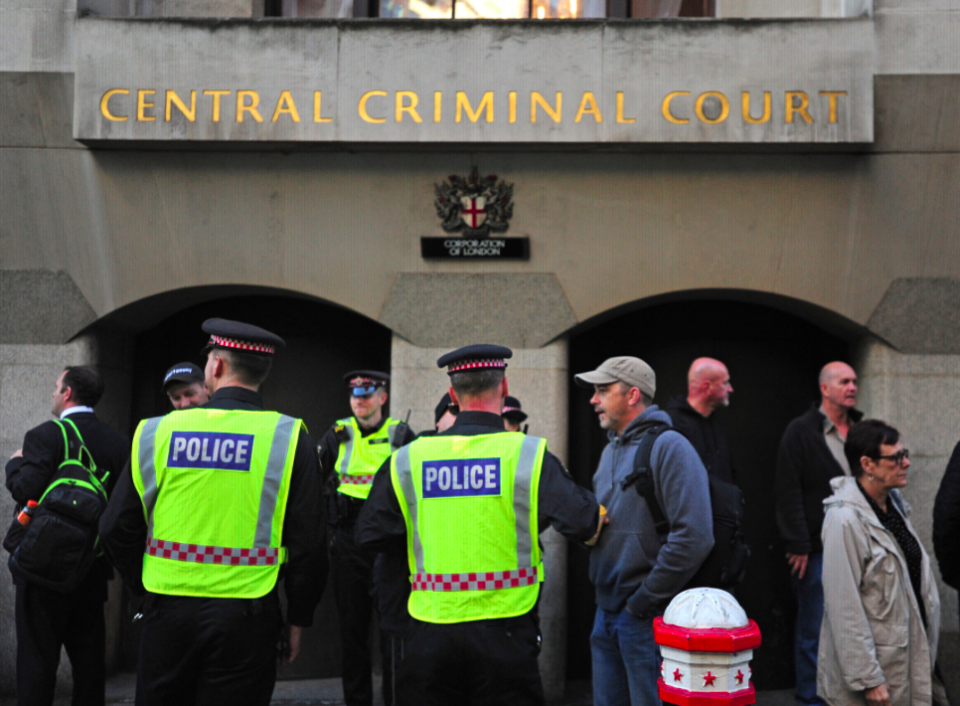Tommy Robinson ‘quietly confident’ as judge adjourns fresh contempt of court case

The judge in Tommy Robinson’s fresh contempt of court hearing has adjourned the case, saying he would receive written submissions before making a ruling at a later date.
The former English Defence League (EDL) leader, 35, arrived at the Old Bailey this morning to cheers from more than 100 people gathered outside court, who had earlier chanted his name.
Protesters from a smaller counter-demonstration carried placards saying ‘oppose Tommy Robinson’.
Robinson was ushered into court amid a large police presence as photographers and cameramen jostled for position.

Asked if he was feeling confident, Robinson told the Press Association: ‘Yeah, quietly.’
The Recorder of London Judge Nicholas Hilliard QC’s decision to adjourn the case will determine whether there will be a substantive hearing at the Old Bailey into the alleged contempt of court.
Robinson, wearing jeans, black trainers, and a grey checked jacket sat behind his barrister Richard Furlong in court.
READ MORE ON YAHOO NEWS UK
This is how much Apple’s new £1,249 iPhone actually costs to make
The shocking stat about cheating university students amid calls for ban on essay-writing firms
Driver’s miracle escape after giant concrete post impales his car
Woman’s warning after sex predator, 41, posed as Uber driver then groped her
I’ll call a general election: Corbyn brands a no-deal Brexit a ‘national disaster’
Scotland Yard applies for MORE cash in hunt for missing Madeleine McCann
He was referred to by his real name, Stephen Yaxley-Lennon, throughout the brief hearing.
Robinson was released from prison last month after three leading judges quashed a finding made at Leeds Crown Court in May, and granted him conditional bail from a 13-month jail sentence.
He is alleged to have committed contempt of court by filming people in a criminal trial and broadcasting footage on social media.

The far-right activist could face being sent back to jail if the judge ultimately finds him in contempt – the maximum sentence is two years imprisonment.
Robinson was jailed in May after filming people involved in a criminal trial and broadcasting the footage on social media, and has already served the equivalent of a four-month sentence.
He was sentenced to 10 months’ imprisonment for contempt of court, which he admitted, and a further three months for breaching a previous suspended sentence.

In May last year he faced contempt proceedings over footage he filmed during the trial of four men who were later convicted of gang-raping a teenage girl.
A judge at Canterbury Crown Court gave him a three-month suspended sentence and told him his punishment was not about ‘freedom of speech or freedom of the press’ but about ‘justice and ensuring that a trial can be carried out justly and fairly’.
Robinson appealed against both contempt findings at a hearing last month heard by Lord Chief Justice Lord Burnett, Mr Justice Turner and Mrs Justice McGowan.
They found the judge at Leeds should not have commenced contempt proceedings that day.

Lord Burnett said ‘no particulars of the contempt were formulated or put to the appellant’, and there was ‘a muddle over the nature of the contempt being considered’.
He added: ‘Where a custodial term of considerable length is being imposed, it should not usually occur so quickly after the conduct which is complained of; a sentence of committal to immediate custody had been pronounced within five hours of the conduct taking place.’
The judges dismissed Robinson’s appeal in respect of the contempt finding at Canterbury Crown Court.
We cannot accept comments on this article for legal reasons.

 Yahoo News
Yahoo News 

